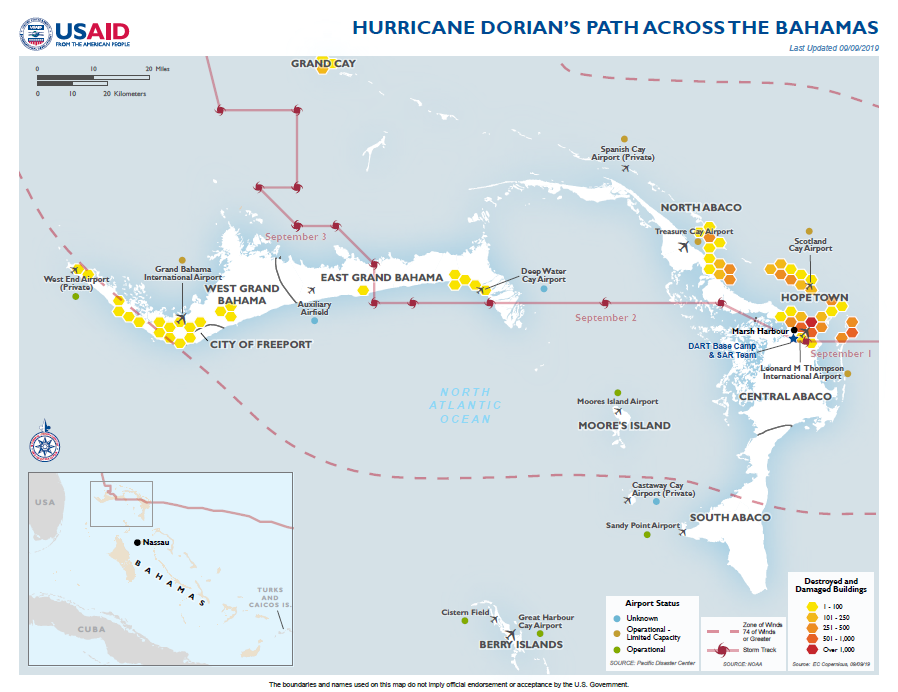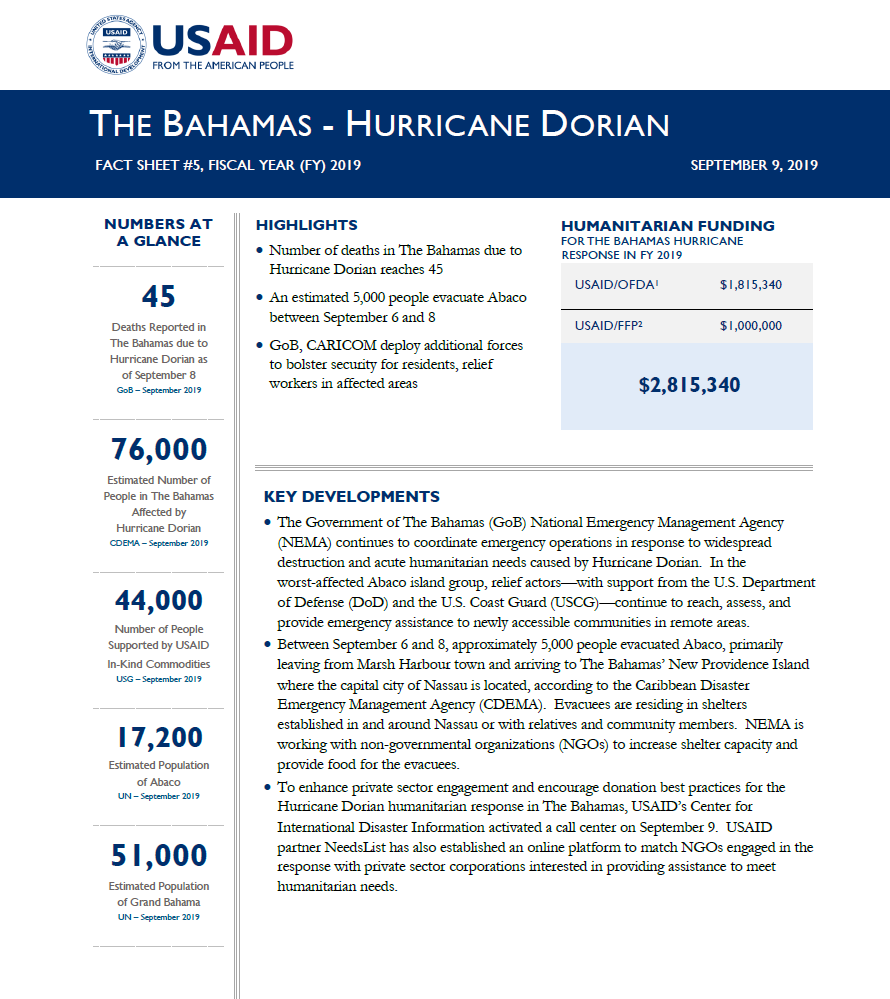- What We Do
- Agriculture and Food Security
- Democracy, Human Rights and Governance
- Economic Growth and Trade
- Education
- Environment and Global Climate Change
- Gender Equality and Women's Empowerment
- Global Health
- Humanitarian Assistance
- Transformation at USAID
- Water and Sanitation
- Working in Crises and Conflict
- U.S. Global Development Lab
Speeches Shim
September 9, 2019
Highlights
Number of deaths in The Bahamas due to Hurricane Dorian reaches 45
An estimated 5,000 people evacuate Abaco between September 6 and 8
GoB, CARICOM deploy additional forces to bolster security for residents, relief workers in affected areas
The Bahamas - Hurricane Dorian Map #5, (FY) 2019 ![]() (pdf - 700k)
(pdf - 700k)
Numbers At A Glance
45
76,000
44,000
17,200
51,000
Humanitarian Funding
FOR THE BAHAMAS HURRICANE RESPONSE IN FY 2019
| USAID/OFDA | $1,815,340 |
| USAID/FFP | $1,000,000 |
| TOTAL | $2,815,340 |
Key Developments
The Government of The Bahamas (GoB) National Emergency Management Agency (NEMA) continues to coordinate emergency operations in response to widespread destruction and acute humanitarian needs caused by Hurricane Dorian. In the worst-affected Abaco island group, relief actors—with support from the U.S. Department of Defense (DoD) and the U.S. Coast Guard (USCG)—continue to reach, assess, and provide emergency assistance to newly accessible communities in remote areas.
Between September 6 and 8, approximately 5,000 people evacuated Abaco, primarily leaving from Marsh Harbour town and arriving to The Bahamas’ New Providence Island where the capital city of Nassau is located, according to the Caribbean Disaster Emergency Management Agency (CDEMA). Evacuees are residing in shelters established in and around Nassau or with relatives and community members. NEMA is working with non-governmental organizations (NGOs) to increase shelter capacity and provide food for the evacuees.
To enhance private sector engagement and encourage donation best practices for the Hurricane Dorian humanitarian response in The Bahamas, USAID’s Center for International Disaster Information activated a call center on September 9. USAID partner NeedsList has also established an online platform to match NGOs engaged in the response with private sector corporations interested in providing assistance to meet humanitarian needs.
CURRENT SITUATION
The Royal Bahamas Police Force confirmed 45 deaths, including 37 deaths in Abaco and eight deaths in Grand Bahama, due to Hurricane Dorian as of September 8.
Approximately 5,000 people evacuated Abaco and surrounding cays using air and sea transports facilitated by the GoB and private sector entities between September 6 and 8, CDEMA reports. Most Abaco residents have evacuated to New Providence, where the GoB has opened several shelters—in churches, schools, and other community facilities—to host the evacuees. As of September 8, the Pacific Disaster Center reported that all shelters in Nassau were at maximum capacity; the GoB is working to organize additional shelter locations and cots in coordination with NGOs. Some evacuees have also sought shelter with relatives or community members in Nassau and other unaffected areas of the country; NEMA has established a call center to match Bahamians willing to host displaced people with evacuees in need. In Abaco, the GoB is working with relief actors to set up temporary housing for displaced persons who remain on the island.
In Marsh Harbour, satellite-based damage assessments have identified approximately 1,100 destroyed buildings and nearly 2,300 damaged buildings; in some localized areas of Marsh Harbour, the satellite-based assessments indicate that up to 75 percent of buildings were destroyed, according to the NGO Map Action. Several nearby cays off the eastern coast of Abaco, including Elbow, Great Guana, Green Turtle, and Scotland, also experienced destruction of between 25 and 75 percent of buildings. NEMA reported on September 8 that large-scale operations for debris removal have not yet commenced in Abaco as search-and-rescue (SAR) missions are ongoing.
NATIONAL AND INTERNATIONAL RESPONSE
In Abaco, NEMA reports that a local emergency operations center (EOC), led by the Permanent Secretary at the Ministry of Foreign Affairs Jack Thompson, is coordinating the response; NEMA is deploying additional personnel to support the Abaco EOC. Members of the USAID Disaster Assistance Response Team (DART) and USAID-deployed SAR team are also providing support to the EOC, while Télécoms Sans Frontières facilitated the set-up of satellite communications for the EOC.
NEMA continues to work with local and international organizations and private sector actors to provide food to affected communities in Abaco and Grand Bahama. In Abaco, the UN World Food Program (WFP) distributed nearly 2,000 ready-to-eat meals to critically affected populations on September 8 and 9, while the NGOs Hands for Hunger and World Central Kitchen began distributing 2,000 hot meals in northern Abaco on September 9. In Grand Bahama, Royal Caribbean International is providing between 10,000 and 20,000 hot meals per day, with NEMA providing complementary non-perishable food items. Additionally, the Bahamas Red Cross Society (BRCS) and Bahamas Feeding Network, among other actors, are providing meals to evacuees sheltering in New Providence.
The Bahamas Civil Aviation Authority (BCAA) has issued a notice to airmen restricting airspace over Abaco and Grand Bahama to humanitarian-related operations to improve airspace management. The BCAA is also monitoring reports of for-fee air evacuations and revoking flight authorizations for any operators found to be charging fees for evacuations. NEMA has assured residents that evacuations are free of charge and is working with other GoB authorities to ensure refunds for those who incurred costs for evacuation services.
To ensure the safety and security of residents and relief workers, the GoB had deployed approximately 270 and 670 Royal Bahamas Police Force and Royal Bahamas Defense Force officers, respectively, to Abaco and Grand Bahama by September 8 in support of local forces. Additionally, a Caribbean Community (CARICOM) deployment of approximately 120 security personnel from the Jamaican Defense Force and 100 security personnel from the Republic of Trinidad and Tobago had arrived in The Bahamas as of the same day to support Bahamian forces.
International donors continue to support the humanitarian response with financial contributions and deployment of disaster response personnel and specialized resources. The Government of Canada has contributed approximately $380,000 to the Canadian Red Cross Society for the distribution of emergency shelter and other relief commodities and deployed a CC-130J Hercules aircraft to provide initial airlift support to the Jamaican Defense Force’s Disaster Assistance Response Team; a Canadian Disaster Assistance Team, including experts from Global Affairs Canada and the Canadian Armed Forces, is also deployed to The Bahamas. Additionally, the Government of India announced a $1 million contribution toward disaster response efforts in the Bahamas on September 9, while on September 5 the Government of Japan reported providing relief commodities, including blankets and shelters, to the affected islands. Moreover, the Inter-American Development Bank has committed $200,000 to support NEMA.
USG RESPONSE
The DoD, in coordination with USAID and the GoB, is providing aircraft support to transport humanitarian personnel and supplies from Nassau to affected islands. On September 9, U.S. Northern Command (NORTHCOM) transported more than 23 metric tons (MT) of supplies—including chainsaws for debris removal, generators, hygiene kits, plastic sheeting, ready-to-eat meals, solar lights, and other materials to support the supply of safe drinking water—to Marsh Harbour on behalf of the NGO Samaritan’s Purse. NORTHCOM also facilitated four flights for the USAID-deployed SAR team to search and clear houses and distribute safe drinking water to affected communities. The day prior, NORTHCOM-supported flights transported more than 72 MT of relief commodities and 183 response personnel, including individuals from the GoB, NGOs, the UN, and the SAR team, as well as four SAR canines, to affected areas of Abaco and nearby cays for humanitarian assessments, commodity distributions, and SAR operations.
The USCG also continues SAR efforts, rescuing 383 people to date from storm-affected areas of Abaco and Grand Bahama.
USAID’s Center for International Disaster Information activated a call center—reachable at +1.202.661.7710—on September 9 to coordinate private sector engagement and donation inquiries for the Hurricane Dorian humanitarian response in The Bahamas. USAID has also collaborated with its partner NeedsList to provide an online platform for private sector entities to match their available resources with needs identified by NGOs engaging in the Hurricane Dorian humanitarian response.
CONTEXT
From September 1 to 2, Hurricane Dorian made landfall over Abaco and Grand Bahama as a Category 5 storm on the Saffir-Simpson Hurricane Wind Scale, bringing sustained winds of approximately 180 miles per hour, heavy rains, and storm surges of up to 23 feet to the islands.
As a result of widespread flooding and destruction to infrastructure caused by Hurricane Dorian, U.S. Chargé d’Affaires Stephanie Bowers declared a disaster in The Bahamas on September 2. In response, USAID/OFDA provided an initial $200,000 to The Bahamas Red Cross Society and rapidly activated a DART and Response Management Team (RMT). USAID/OFDA is also coordinating with the USCG, part of the U.S. Department of Homeland Security; the U.S. Department of Defense; and the GoB to swiftly deliver emergency relief items to populations in The Bahamas most severely affected by the hurricane.
PUBLIC DONATION INFORMATION
The most effective way people can assist relief efforts is by making cash contributions to humanitarian organizations that are conducting relief operations. A list of humanitarian organizations that are accepting cash donations for disaster responses around the world can be found at www.interaction.org.
USAID encourages cash donations because they allow aid professionals to procure the exact items needed (often in the affected region); reduce the burden on scarce resources (such as transportation routes, staff time, and warehouse space); can be transferred very quickly and without transportation costs; support the economy of the disaster-stricken region; and ensure culturally, dietarily, and environmentally appropriate assistance.
More information can be found at: USAID Center for International Disaster Information: www.cidi.org/hurricane-dorian/ or +1.202.661.7710. Information on relief activities of the humanitarian community can be found at http://www.reliefweb.int.



Comment
Make a general inquiry or suggest an improvement.